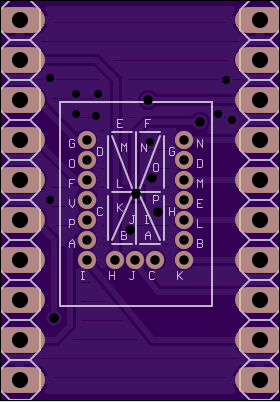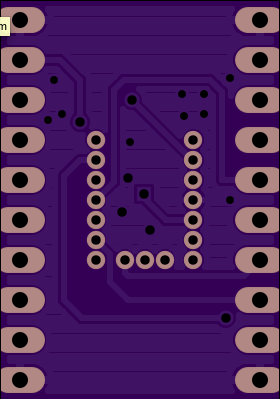CHANGE LOG
2015-02-18 added pcb section
2015-02-17 first draft
INTRODUCTION
While I was looking on eBay for alphanumeric displays, I stumbled across 9 of those displays and had to buy them for about 10EURs all together. I didn't know anything about them but I was all in at that time, because I was thinking about doing a "back to the future" timer circuit at that time. I will use this page to collect all the data and informations I found on those and how I will use them and what for later on. There are 8 displays that are labeled with KW-104AL but number nine has "PINLITE 0-64 28564" on one side and "X-2393 8525" written on it.
DATA
It has a high readability in sunlight and is good for aircraft instrument panels.
Type: incandescent display
Voltage: 4V [link 1]
Current: 15mA [link 1]
Brightness: 13000 Ft/L (brightness) [link 1]
Footprint: weird c shaped socket pins
MEASUREMENTS

This is taken from the scan hosted on [link 2]
CONTROLLING
4V - throwing a single arduino at it? 15mA * 16 elements? 240mA - probably not. So shift registers again, since the 74HC595 works from 2V to 6V according to the datasheet. That means 2 595ers for a single display, but 120mA is still too much to handle for a 74HC595 with 70mA rating. With a resistor of 68ohms I could drop the voltage from 5V to 4V as well.
PCBS AND EAGLE FILES
I'm working on a breakout board for breadboards and a tiny little 74hc595 board. Library with footprint is in git. Breakout boards are ordered. https://github.com/davedarko/KW-104AL
Top

Bottom

LINKS
[GITHUB] https://github.com/davedarko/KW-104AL
[link 1] http://www.koto-jp.com/en/product_item_001_04.html
Seems to be the producer of those things
[link 2] http://www.element14.com/community/docs/DOC-53880/l/kw-104alpdf
Scan of a catalog(?) with dimensions of multiple types
Not yet used in this article but probably a good read:
http://www.decadecounter.com/vta/tubepage.php?item=17&user=0
http://www.decadecounter.com/vta/articleview.php?item=777
http://www.ineedcaffeine.com/content/wamco-kw-105al/
THINGS TO GOOGLE
minitrons, numitrons, other stuff like KW-105AL (more common), incandescent displays, Wamco KW-105AL
 davedarko
davedarko
Discussions
Become a Hackaday.io Member
Create an account to leave a comment. Already have an account? Log In.
...How do you do it, man? You're like a new project/PCB every day!
Anyways, had an "ooh, incandescent display" moment. My power-supply has an incandescent multimeter built-in for voltage/current monitoring. Had to do *something* with those cool displays... but had no idea they came in >7seg. Awesome find!
As for direct-driving: could maybe split the loading on the AVR by only driving one segment at a time...? might get dim, and who knows what effect high-frequency pulsing would have on those filaments (and are filaments anything like inductors?)... and... there's always that ULN2003(?) you used in another project...
Are you sure? yes | no
This page is 3 weeks old, but yes, it sometimes feels exactly like that. This place inspires me every day and I love looking for displays on ebay. I have a long list of ideas and projects I want to work on, that started when I was much younger, but I never felt able to achieve them. Only with 3D printing and working on my skills in designing pcbs and learning more and more about electronics I'm now at a point where I can freely work on all that.
I'm also unsure about pwm'ing those displays, so the SCT2024s jaromir was suggesting do sound promising, with fixed currents and one chip replacing 4ICs and 16 resistors ;)
Are you sure? yes | no
... 4ICs is great. Resistors....? Are they necessary with incandescents? I don't think I've seen one on a light-bulb ;)
OTOH, probably wouldn't hurt. These'd be a lot harder to replace than a lightbulb. Current-limiting, or under-voltaging-'em... (My dad, an electrician, claims that 130V incandescents last a *lot* longer than 120V, when run on household wiring, which is 120V)
Anyways, you're also a handy-follow for new chip-ideas. I usually end up limiting myself to what I have (or have had) on-hand...
Are you sure? yes | no
The 4 in KW104-AL stands for 4V and I've read that the same current limiting stuff you'd do on a LED would work here, too ;) So using them on 5V would be like using a 130V bulb on a 160V line? Hm, maybe I'll run everything on 4Vs to be sure.
Are you sure? yes | no
...well, I was thinking 3.6... It was just an idea to save component-count, but you've already accomplished that.
Wow. This page is the top google hit (and high-up in the image-search) for "KW104-AL"... Ahh, "KW-105-AL" returns more results... I almost thought you were pulling our leg with this (alleged) find.
Are you sure? yes | no
could have been 10V as well, or 10kV, or 104V :D I would not have known that just by looking at the name.
Yeah, the best results for searching for details i got were the ones where I googled KW-105-AL.
Are you sure? yes | no
http://www.starchips.com.tw/pdf/datasheet/SCT2024V01_03.pdf
Are you sure? yes | no
Yep, that's it.
Just curious - where did you buy it? I bought mine at www.tme.eu - they are Polish, but have good EU coverage and ship with 4,9EUR shipping fee (at least to Slovakia), no matter what you order; their prices are very good, generally better than Farnell/Mouser, though with not that wide assortment of goods. Anyway, I buy 99% of parts there.
Are you sure? yes | no
Sounds good, I'll check them out! I bought them here: http://shop.ulrichradig.de/Bauelemente/aktive/Schnittstellen-ICs/SCT2024-CSOG.html - The website of Ulrich Radig was one of the first german sites I discovered with interesting AVR projects.
Are you sure? yes | no
wow, they would have been way cheeper - anyway, this way I paid something back / funded a bit to his website.
Are you sure? yes | no
Yes, I know Ulrich.
This particular chip is more expensive, but some of his prices are really great. I checked a few items in "Leiterplatten" section and it looks great. Thanks for the tip. My German is more than poor, but I'll check his e-shop.
Are you sure? yes | no
Regarding the LED driver - I used a SCT2024 a few times. It comes with constant current drivers (no external resistors needed), has a lot of current capability and i can buy it locally for 0,35E or so. It comes in SSOP24 package and the pinout was the same as some other manufacturers use - I remember it has the same pinout as some ST part and some other chinese brand part, so those seems to be quite generic parts.
The SCT2024 acts like 16-bit serial-in shift register and you can daisy-chain them easily, just like 74HC595.
Are you sure? yes | no
The ST part is STP16CP05.
Are you sure? yes | no
Thank you very much!! I've found a store that sells SCT2024s and they were cheaper than the STP16CP05 - so I bought 10 of them. That is much better than using 2 shift registers, 2 uln2803s and 16 resistors!
Are you sure? yes | no
Oh well, I am so stupid. Of course I did what I had to do: I haven't mirrored the pins when I created the library part, but I'm still able to use the breakout board pcb, I just have to rotate it.
Are you sure? yes | no